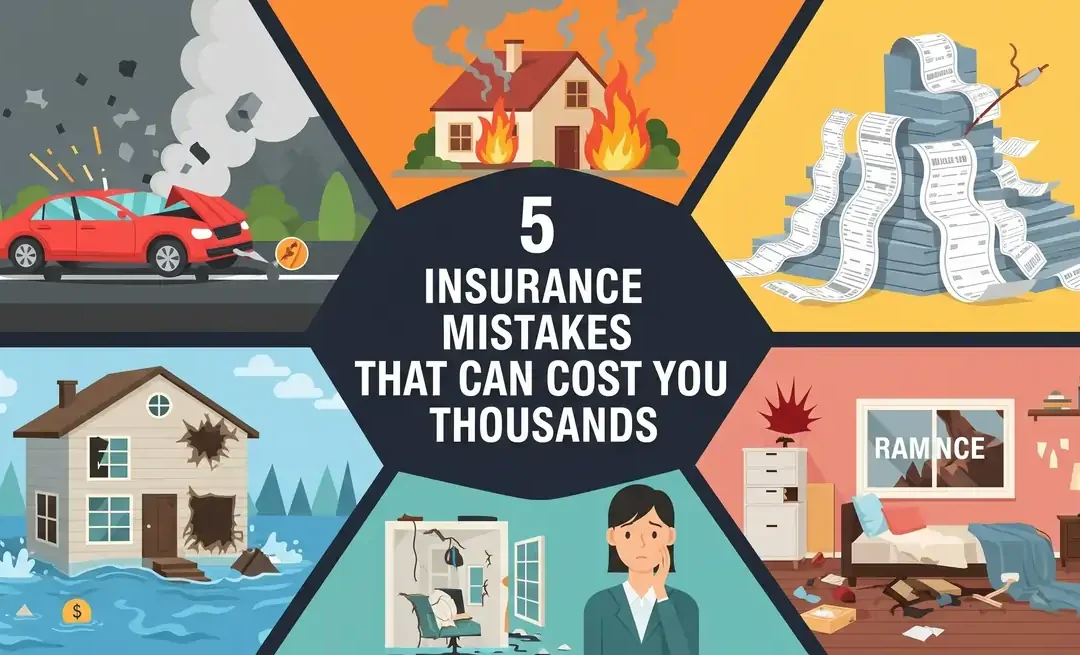Insurance is one of those things you don’t even think about until you really need it—and then it’s too late. That little error in your insurance choices today might cost you thousands later on. Whether it’s health, life, automobile, or house insurance, steering clear of pitfalls is key to defending your finances.
Let’s look at the most prevalent insurance errors individuals commit and how they can financially harm you.
1. Underinsuring Yourself or Your Property
The first mistake is that many individuals attempt to save money. Because of this, they start ignoring important things like choosing good premium insurance. They often select the minimum premium, resulting in minimum coverage. Underinsuring is the reason for enormous out-of-pocket costs at the time of claims. It will ultimately cost more money, defeating the agenda of “savings”.
Assume that your home is worth ₹1 crore and you only insure it for ₹50 lakhs. During a large-scale fire, the insurance will cover only a portion of your loss, even if it’s a complete loss.
| Item | Actual Value | Insured Value | Coverage Gap |
| House (Structure only) | ₹1,00,00,000 | ₹50,00,000 | ₹50,00,000 |
It’s always best to choose coverage for the replacement value rather than the market value. Go through your policy annually because property and asset prices fluctuate.
2. Not Providing Complete Information
Another common mistake that individuals make is withholding or concealing facts while applying for a policy, such as existing diseases or previous accidents, etc. This can be a problem at the time of claiming the insurance, as it can even be denied. It is advised to be truthful while going for insurance for one’s own good.
Example:
Ravi did not reveal his diabetes history while purchasing a health insurance cover. His claim for hospitalization was rejected two years later due to nondisclosure.
Therefore, reveal complete and truthful details at all costs, even though it might increase your premium marginally. But in the long run, it will help in saving much more money. It helps in safeguarding your claim in the future.
3. Buying the Lowest Premium Without Knowing Coverage
It’s tempting to choose the least expensive insurance plan when you’re young and attempting to manage your finances responsibly. After all, if you can get coverage for less money, why pay more? The reality is that, particularly when it comes to insurance, less isn’t always better.
Selecting the cheapest insurance without carefully reading the fine print can result in inadequate coverage, unforeseen costs, and regret in an emergency.
You risk being dangerously underinsured if you choose a policy only on the basis of the premium cost without knowing what it actually covers. Low-cost plans frequently include:
- Restricted coverage
- Increased out-of-pocket costs, or deductibles
- Exclusions that might go unnoticed until it’s too late
Example:
Vidhi, a 25-year-old professional in the workforce, desired to reduce the cost of her auto insurance. Without looking over the coverage details, she selected the least expensive policy on the internet. She had an accident a few months later.
She was shocked to discover that her policy only covered third-party liability and not damages to her own vehicle when she filed a claim. She ultimately had to pay ₹35,000 out of pocket for repairs, which was significantly more than the money she would have saved by selecting the less expensive premium.
4. Letting Policies Lapse: An Error That Could Cost You More Than Money
It’s simple to forget that one email reminder from your insurance company when you’re balancing rent, bills, work-related stress, and possibly even student loans. However, if you allow your insurance policy to lapse, even for a few weeks, you may later face reduced benefits, increased premiums, or even a total denial of claims. Many individuals in their 20s and 30s neglect to renew their insurance. Letting a policy expire, whether it be for life, health, or auto insurance, can result in:
- Losing the advantages of continuity
- Waiting times will increase once more.
- Requiring new medical examinations
- Increasing the premium to obtain reinsurance
Example:
Mili, after missing her health insurance renewal by 45 days, had to go through a fresh waiting period of 2 years for pre-existing conditions. She could have simply avoided that by setting calendar reminders or opting for auto-debit payments, if available.
5. Not Updating Policies After Life Events: A Potential Threat
From getting married and starting a family to buying a new house or car, life is always changing. However, a lot of people forget to update their insurance policies to reflect these changes, which is an essential step.
Not updating your policies can result in insufficient protection and complicated claims, whether you’re adding a new dependent to your health policy, increasing your life insurance coverage following a pay increase, or adding a new car to your motor insurance.
Example:
Mohit thought his current auto insurance would cover the purchase of a second vehicle. However, because he had neglected to notify his insurer or update the policy to reflect the new car, his claim was denied when the vehicle was stolen. After any significant life change, always review and update your insurance portfolio to prevent such expensive mistakes. This covers adjustments to the number of dependents, assets, marital status, and address. Regular updates guarantee that your coverage is up to date, that claims are processed, and that you maintain your financial stability throughout life’s changes.
Bottomline
Insurance isn’t a mere formality—it’s your financial security. Making the right choice today can save you lakhs or thousands down the line. Knowing your policy, renewing it periodically, and making informed decisions ensures that you’re protected when life gives you a curveball.
Understand the value of good insurance and save thousands.
Written by: Tanya Kumari


